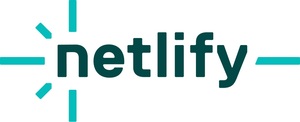
SAN FRANCISCO, March 16, 2021 /PRNewswire/ -- Netlify, pioneer of the modern Jamstack web architecture, today announced the ability to auto-detect and install Next.js applications with zero configuration, fully integrating the popular web framework with the Netlify developer experience. Now, for the first time, businesses can run Next.js 10 on enterprise-ready infrastructure with critical features for teams. This includes role-based access, SAML single sign-on, two-factor authentication, integration with self-hosted GitLab and GitHub, and SOC 2 Type 2 attestation.
Freedom to choose a framework, without compromise
Netlify is designed for teams to modernize web architecture and workflow without locking in a JavaScript framework. With this new integration, teams can choose what's optimal for every project and team. Each team can easily migrate to Next.js from another framework or choose from a rapidly evolving ecosystem of frameworks such as Angular, 11ty, Nuxt.js, Vue.js and more.
The new Next.js integration means that configuration and feature support is automatically enabled on Netlify without requiring any setup. Netlify auto-detects the framework and enables support for:
- Preview mode: Server-side render a live preview of a web app to share, gather feedback and make changes in real-time without ever requiring a build.
- Next.js 10: Key elements of Next.js 10 and up are enabled on Netlify including internationalized routing and React 17 support.
- Atomic and immutable deploys: Full compatibility with incremental static regeneration and server-side rendering techniques by serving via Netlify Functions.
Netlify is also developing a solution to more effectively handle Incremental Static Regeneration (ISR) in Next.js. For large applications, it's appealing to have "unbuilt" pages that render at runtime instead of build time, but, with other solutions that implement ISR, this comes at the cost of breaking atomic and immutable deploys. The result is an inconsistent user experience and operational complexity. Netlify is actively developing an approach that can solve these compromises and further bring that functionality to other JavaScript frameworks.
Next.js apps ready for enterprise teams
In addition to offering deep integration with Next.js, Netlify offers a unique set of capabilities that make it possible for large enterprise teams to run Next.js applications.
- Unified development workflow: Build, test, deploy and manage frontend and serverless code together from a single Git-based workflow. Use powerful Netlify features like Deploy Previews, Split Testing, and instant rollbacks across the entire app.
- Release management controls: Handle even the most complex web rollouts with features such as build settings and environmental variables tailored to branches, split testing for managed rollouts, and controls to limit publishing to the main branch.
- Security and compliance: Netlify supports businesses with security requirements including SOC 2 Type 2 attestation, SAML single sign-on (SSO) support, role-based access control and two-factor authentication.
- Self-hosted GitHub and GitLab integration: Use Netlify with enterprise versions of GitHub and GitLab that are often self-hosted. The integration is enabled and managed from the Netlify UI.
- 24/7/365 production support: A dedicated support engineer and solutions engineer who knows each team and their tech stack. Available via phone, Slack and email with a guaranteed response SLA.
Netlify is showcasing Next.js with its partner community in a virtual event today, featuring talks from agency partner AKQA and customer Guide Dogs for the Blind. Become a Netlify partner. The Essential Next.js plugin on Netlify is available to all Netlify users today.
Supporting Quotes
Matt Biilmann, CEO and co-founder, Netlify
"Simplicity is a prerequisite for reliability. The Jamstack architecture creates a set of default decisions that lead to simpler, more reliable and more flexible products. Teams deploying Next.js on Netlify will be able to take advantage of the exciting features Next.js offers without risking the pitfalls and complexity of giving up atomic, immutable deploys."
Yashar Rassoulli, CTO, Myplanet
"As a software studio, we're working with the world's most influential organizations and relying on reliable, modern platforms like Netlify. We selected Next.js on Netlify for our customer Spirent, a multinational telecommunications testing company. The customer is impressed by the ease in their web team's workflow and the overall better site performance for their visitors."
Additional Resources
- Netlify for enterprises
- Learn about careers at Netlify
- Learn about Jamstack
- Learn about Next.js at Jamstack Explorers
Connect with Netlify
- Learn about Netlify
- Netlify newsroom
- Netlify blog
- Follow Netlify on Twitter
- Join the Netlify developer community
- Become a Netlify partner
About Netlify
Netlify is the web development cloud for teams. Used by more than 1,500,000 web developers and businesses, the Netlify platform provides modern build workflows, serverless functions and a global multi-cloud Edge network to deliver the most performant, secure and scalable websites and applications. Netlify originated the Jamstack category, a modern web architecture that marries the best practices of pre-built sites with the API economy and serverless functions, to deliver faster load times and dynamic content, without worrying about web servers. Founded in 2014, Netlify is a venture-backed software company headquartered in San Francisco with a global team. For more information, visit www.netlify.com and follow @Netlify on Twitter.
Media contact
Kelly Tenn
Netlify
[email protected]
SOURCE Netlify






Share this article